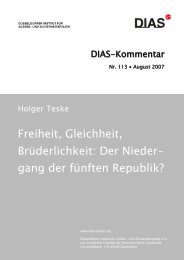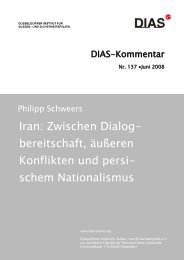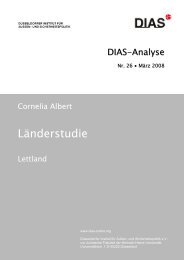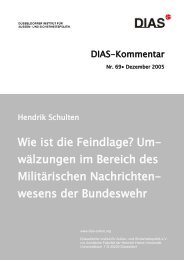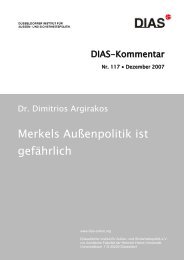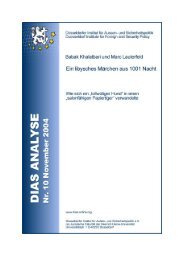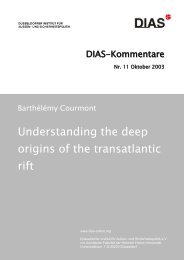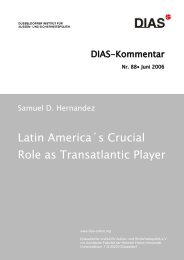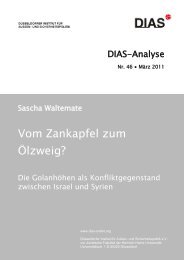NATO Collective Security or Defense - DIAS - Düsseldorfer Institut ...
NATO Collective Security or Defense - DIAS - Düsseldorfer Institut ...
NATO Collective Security or Defense - DIAS - Düsseldorfer Institut ...
Create successful ePaper yourself
Turn your PDF publications into a flip-book with our unique Google optimized e-Paper software.
Joshua Stern: <strong>NATO</strong> <strong>Collective</strong> <strong>Security</strong> <strong>or</strong> <strong>Defense</strong>: The Future of <strong>NATO</strong> in Light of Expansion and 9/11<br />
periphery b<strong>or</strong>der Russia. 23. Stephen Walt, in Charles Kupchan (ed.), Atlantic <strong>Security</strong>: Contending<br />
Visions (New Y<strong>or</strong>k, NY: Council of F<strong>or</strong>eign Relations, 1998), p. 2. 24. Ibid. 25. Turkey<br />
could be included if it is never allowed to join the EU. 26. Howard Wiarda, “Where Does<br />
Europe End? The Politics of <strong>NATO</strong> and EU Enlargement”, W<strong>or</strong>ld Affairs, Vol. 164, Issue 4,<br />
(Spring 2002), p. 147. 27. Celeste Wallander, “<strong>NATO</strong>‟s Price”, F<strong>or</strong>eign Affairs, Vol. 81 Issue<br />
6, (Nov/Dec 2002), p. 2. 28. Ibid. 29. Expansion of the alliance also diversifies opinions about<br />
what is in the alliance‟s self-interest. 30. Ronald Asmus and Kenneth Pollack, “The New<br />
Transatlantic Project: A Response to Robert Kagan”, Policy Re-view (October/November<br />
2002), p. 4. 31. L<strong>or</strong>d Robertson, “Transf<strong>or</strong>ming <strong>NATO</strong>”, <strong>NATO</strong> Review (Spring 2003),<br />
www.nato.int/docu/review/ 2003/issue1/english/art1.html 32. Robert Kagan, “Power and<br />
Weakness”, Policy Review (June & July 2002), p. 4. 33. Andrew M<strong>or</strong>avcsik, “Striking a New<br />
Transatlantic Bargain”, F<strong>or</strong>eign Affairs, Vol. 82, Issue 4, (July/August 2003), p. 5. 34. Michael<br />
Dunn, “US F<strong>or</strong>eign Relations in the Twentieth Century: From W<strong>or</strong>ld Power to Global<br />
Hegemony”, In-ternational Affairs, Vol. 76, Issue 1. (January 2002). Dunn makes a very convincing<br />
argument that America‟s view and belief in unilateralism is not based only on power.<br />
He links it to US‟ isolationist past, which argue isolationist tendencies is based on a general<br />
idea the US has never wanted to be restrained in defending its national interest: “As Truman<br />
himself noted in hid Memoirs, his task was to refashion what may be called the canon of<br />
American diplomacy to move American people and Congress away from territ<strong>or</strong>ial restrictions<br />
of the „patron saints‟ of iso-lationism (Washington and Monroe particularly) and adopt<br />
w<strong>or</strong>ldwide multilateralism in the pursuit of American national interests. What Truman failed<br />
to ad, like the maj<strong>or</strong>ity of commentat<strong>or</strong>s then and later, was that unilater-alism so treasured by<br />
isolationists was not going to be abandoned but rather would be re-enf<strong>or</strong>ced by postwar multilateralism,<br />
so long desired by the internationalist”. What Dunn is implying is even when the<br />
US acted multi-laterally after W<strong>or</strong>ld War II, and set up the UN and <strong>NATO</strong> it did because it<br />
felt it was the best way to serve its own self-interest. From this idea it is not a maj<strong>or</strong> leap to<br />
understand that after 9/11 the US would act even m<strong>or</strong>e unilateral and move outside <strong>NATO</strong> to<br />
better serve its own interests, rather then have its interests be shackled by a multilateral institution.”<br />
35. Joseph Nye, “US Power and Strategy After Iraq”, F<strong>or</strong>eign Affairs, Vol. 82 Issue<br />
4, (July/August 2003), p. 60. 36. Also take into account US actions bef<strong>or</strong>e 9/11, opting out of<br />
Kyoto, the ICC, and the Anti-Ballistic Missile Treaty all display a unilateral tendency by the<br />
US. The interesting thing will be to see if this changes when the current administration<br />
changes (Bush)and if the terr<strong>or</strong>ist threat diminishes in the future. 37. Joseph Nye, “US Power<br />
and Strategy After Iraq”, F<strong>or</strong>eign Affairs, Vol. 82 Issue 4, (July/August 2003), p. 60. 38. Paul<br />
Dibb, “The Future of International Coalitions: How Useful? How Manageable?”, The Washington<br />
Quarterly, (Spring 2002), p. 133. 38. Jonathan Stevenson, “How Europe and America<br />
Defend Themselves”, F<strong>or</strong>eign Affairs, Vol. 82 Issue 2, (March/April 2003), p. 75.



